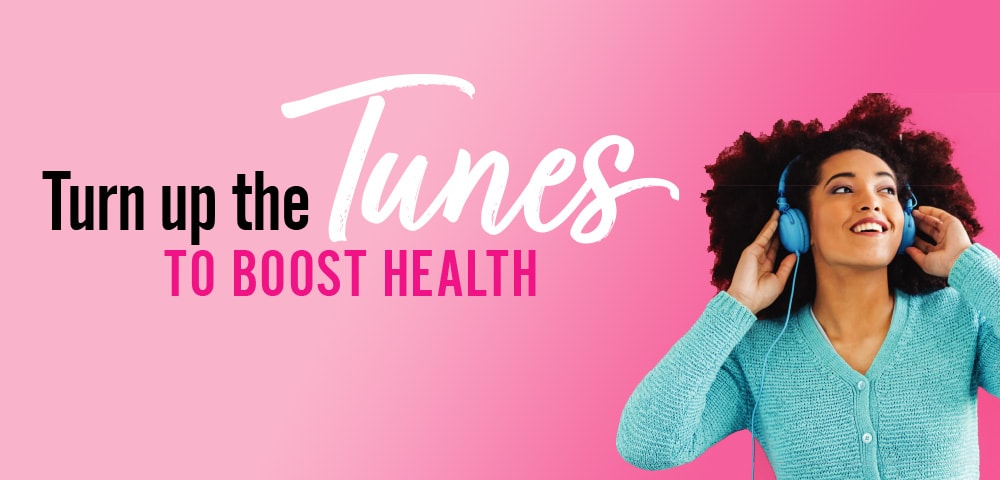
Research reveals that listening to music can improve mental well-being, and boost health in surprising ways.
Unites the world. Unlike really anything else, music communicates in a language of its own.
Creates joy. Listening to music causes the brain to release the happiness hormone, dopamine. Neuroscientists at McGill University could watch it happen on a PET scan.
Chases away the blues. Millions of people worldwide suffer from depression, so it’s good news that German scientists have found mood-improving benefits for those who listen to meditative or orchestral music. Unfortunately, techno and heavy metal seemed to worsen depressive feelings.
Sets the tone for your workout. Want to improve your jogging or running times? Boost performance by picking an inspiring playlist – it doesn’t seem to matter whether it’s a fast or slow tempo. Studies in the Journal of Strength and Conditioning Research say music matters in performance.
Mitigates daily stress. Did you know you can reduce cortisol levels and boost your body’s immune response by listening to or making music? Plus, the American Institute of Stress gave bonus points simply for moving, grooving, and, more importantly, singing along. Dutch researchers also found that drivers listening to music feel less frustration in traffic, making them safer drivers.
Pairs well with food. Listening to music while eating dinner enhances our enjoyment of it and causes us to consume fewer calories. Music as a weight-loss strategy? Researchers at Georgia Tech say the effect is measurable.
Transports us to dreamland. Thirty percent of Americans have insomnia, but research suggests that just 45 minutes of classical music at bedtime results in significantly better sleep.
Relaxes and relieves pain. Researchers have found that music reduces pre-surgical anxiety more effectively than a commonly offered anxiety drug, with none of the drug’s side effects. A Drexel University study found that music therapy and pre-recorded music are better than medical treatments for pain in cancer patients. In contrast, other studies showed similar effects in intensive care and geriatric patients.
Helps aging brains stay agile. Healthy older adults with 10 or more years of musical experience, and musicians with 1–9 years of musical study score higher on cognitive tests than non-musicians.
Speaks to us. A University of Helsinki study showed that stroke patients who listened to music of their choice for two hours per day recovered cognitive function quicker than those who didn’t. It’s the lyrics combined with music that seemed to boost patient recovery.
Enhances memories. Listening to music becomes a part of our lives and can shape who we are. Geriatricians at the University of California-Irvine say music awakens dementia patients because it involves many brain areas at once, activating pathways that remain unaffected by the disease. So, if you’re tempted to forego the tunes, don’t, turn the music on, but remember not too loud!
References
- McGill: Investigations of the links between music, emotion and reward, Valorie Salimpoor
- The Journal of Strength and Conditioning Research: How Does Music Aid 5 km of Running?
- Psychology Today: Cortisol: Why the “Stress Hormone” Is Public Enemy No. 1
- The American Institute of Stress: Master Your Stress.
- J Music Ther.: The effects of active and passive participation in musical activity on the immune system as measured by salivary immunoglobulin A (SIgA).
- The Better Sleep Guide: The Insomnia Statistics.
- J Adv Nurs.: Music improves sleep quality in students.
- World Health Organization: Depression.
- Dialogues Clin Neurosci.: Sleep disturbances and depression: risk relationships for subsequent depression and therapeutic implications.
- Dtsch Med Wochenschr.: [Music and health–what kind of music is helpful for whom? What music not?].
- Georgia Tech News Center: Helpful Hints for Healthy Holiday Eating.
- Ergonomics.: The influence of music on mood and performance while driving.
- Front Psychol.: Pleasurable music affects reinforcement learning according to the listener.
- J Clin Nurs. : Soothing music can increase oxytocin levels during bed rest after open-heart surgery: a randomised control trial.
- Wise Geek: How Many Surgeries Are Performed Each Year?
- Alzheimers.net: Music Therapy For Dementia: Awakening Memories.
- Alzheimer’s Association: Facts & Figures.
- EurekAlert: Listening to music improves stroke patients’ recovery.
- Heart.org: Heart and Stroke Statistics.
- APS: Short-Term Music Training Enhances Verbal Intelligence and Executive Function.
- Pacific Standard: Music Training Enhances Children’s Verbal Intelligence.
- PLOS: Practicing a Musical Instrument in Childhood is Associated with Enhanced Verbal Ability and Nonverbal Reasoning.
- US News: Music Training May Help Keep Aging Brain Healthy.
- The Mind Unleashed: This is How Music Is Indeed a Universal Language












